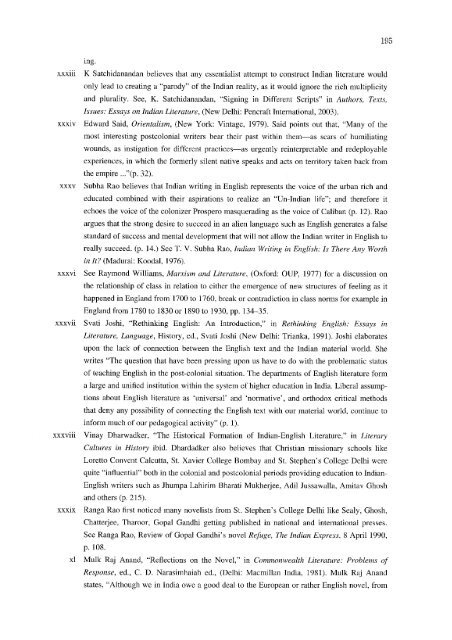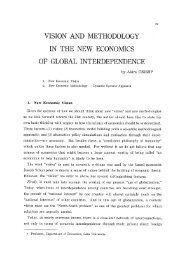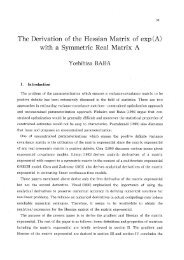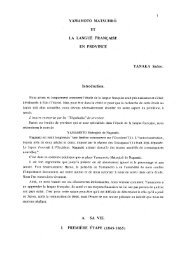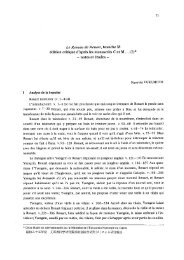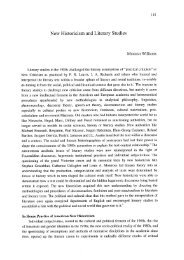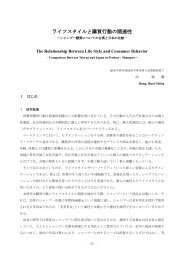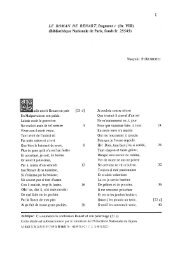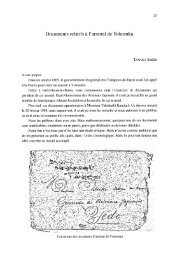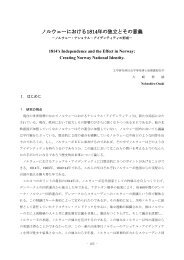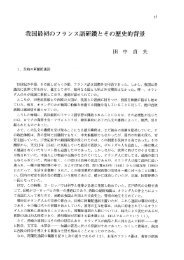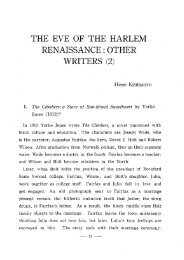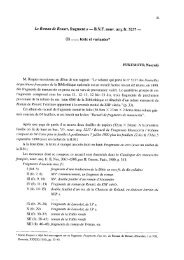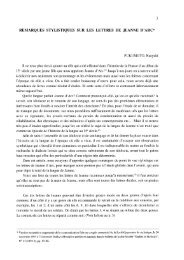Indian Writing in English 1794-2004 - Soka University Repository
Indian Writing in English 1794-2004 - Soka University Repository
Indian Writing in English 1794-2004 - Soka University Repository
Create successful ePaper yourself
Turn your PDF publications into a flip-book with our unique Google optimized e-Paper software.
<strong>in</strong>g.<br />
xxxiii K Satchidanandan believes that any essentialist attempt to construct <strong>Indian</strong> literature would<br />
only lead to creat<strong>in</strong>g a "parody" of the <strong>Indian</strong> reality, as it would ignore the rich multiplicity<br />
and plurality. See, K. Satchidanandan, "Sign<strong>in</strong>g <strong>in</strong> Different Scripts" <strong>in</strong> Authors, Texts,<br />
Issues: Essays on <strong>Indian</strong> Literature, (New Delhi: Pencraft International, 2003).<br />
xxxiv Edward Said, Orientalism, (New York: V<strong>in</strong>tage, 1979). Said po<strong>in</strong>ts out that, "Many of the<br />
most <strong>in</strong>terest<strong>in</strong>g postcolonial writers bear their past with<strong>in</strong> them—as scars of humiliat<strong>in</strong>g<br />
wounds, as <strong>in</strong>stigation for different practices—as urgently re<strong>in</strong>terpretable and redeployable<br />
experiences, <strong>in</strong> which the formerly silent native speaks and acts on territory taken back from<br />
the empire ..."(p. 32).<br />
xxxv Subha Rao believes that <strong>Indian</strong> writ<strong>in</strong>g <strong>in</strong> <strong>English</strong> represents the voice of the urban rich and<br />
educated comb<strong>in</strong>ed with their aspirations to realize an "Un-<strong>Indian</strong> life"; and therefore it<br />
echoes the voice of the colonizer Prospero masquerad<strong>in</strong>g as the voice of Caliban (p. 12). Rao<br />
argues that the strong desire to succeed <strong>in</strong> an alien language such as <strong>English</strong> generates a false<br />
standard of success and mental development that will not allow the <strong>Indian</strong> writer <strong>in</strong> <strong>English</strong> to<br />
really succeed. (p. 14.) See T. V. Subha Rao, <strong>Indian</strong> <strong>Writ<strong>in</strong>g</strong> <strong>in</strong> <strong>English</strong>: Is There Any Worth<br />
<strong>in</strong> It? (Madurai: Koodal, 1976).<br />
xxxvi See Raymond Williams, Marxism and Literature, (Oxford: OUP, 1977) for a discussion on<br />
the relationship of class <strong>in</strong> relation to either the emergence of new structures of feel<strong>in</strong>g as it<br />
happened <strong>in</strong> England from 1700 to 1760, break or contradiction <strong>in</strong> class norms for example <strong>in</strong><br />
England from 1780 to 1830 or 1890 to 1930, pp. 134-35.<br />
xxxvii Svati Joshi, "Reth<strong>in</strong>k<strong>in</strong>g <strong>English</strong>: An Introduction," <strong>in</strong> Reth<strong>in</strong>k<strong>in</strong>g <strong>English</strong>: Essays <strong>in</strong><br />
Literature, Language, History, ed., Svati Joshi (New Delhi: Trianka, 1991). Joshi elaborates<br />
upon the lack of connection between the <strong>English</strong> text and the <strong>Indian</strong> material world. She<br />
writes "The question that have been press<strong>in</strong>g upon us have to do with the problematic status<br />
of teach<strong>in</strong>g <strong>English</strong> <strong>in</strong> the post-colonial situation. The departments of <strong>English</strong> literature form<br />
a large and unified <strong>in</strong>stitution with<strong>in</strong> the system of higher education <strong>in</strong> India. Liberal assump-<br />
tions about <strong>English</strong> literature as `universal' and `normative', and orthodox critical methods<br />
that deny any possibility of connect<strong>in</strong>g the <strong>English</strong> text with our material world, cont<strong>in</strong>ue to<br />
<strong>in</strong>form much of our pedagogical activity" (p. 1).<br />
xxxviii V<strong>in</strong>ay Dharwadker, "The Historical Formation of <strong>Indian</strong>-<strong>English</strong> Literature," <strong>in</strong> Literary<br />
Cultures <strong>in</strong> History ibid. Dhardadker also believes that Christian missionary schools like<br />
Loretto Convent Calcutta, St. Xavier College Bombay and St. Stephen's College Delhi were<br />
quite "<strong>in</strong>fluential" both <strong>in</strong> the colonial and postcolonial periods provid<strong>in</strong>g education to <strong>Indian</strong>-<br />
<strong>English</strong> writers such as Jhumpa Lahirim Bharati Mukherjee, Adil Jussawalla, Amitav Ghosh<br />
and others (p. 215).<br />
xxxix Ranga Rao first noticed many novelists from St. Stephen's College Delhi like Sealy, Ghosh,<br />
Chatterjee, Tharoor, Gopal Gandhi gett<strong>in</strong>g published <strong>in</strong> national and <strong>in</strong>ternational presses.<br />
See Ranga Rao, Review of Gopal Gandhi's novel Refuge, The <strong>Indian</strong> Express, 8 April 1990,<br />
p. 108.<br />
xl Mulk Raj Anand, "Reflections on the Novel," <strong>in</strong> Commonwealth Literature: Problems of<br />
Response, ed., C. D. Narasimhaiah ed., (Delhi: Macmillan India, 1981). Mulk Raj Anand<br />
states, "Although we <strong>in</strong> India owe a good deal to the European or rather <strong>English</strong> novel, from<br />
195


